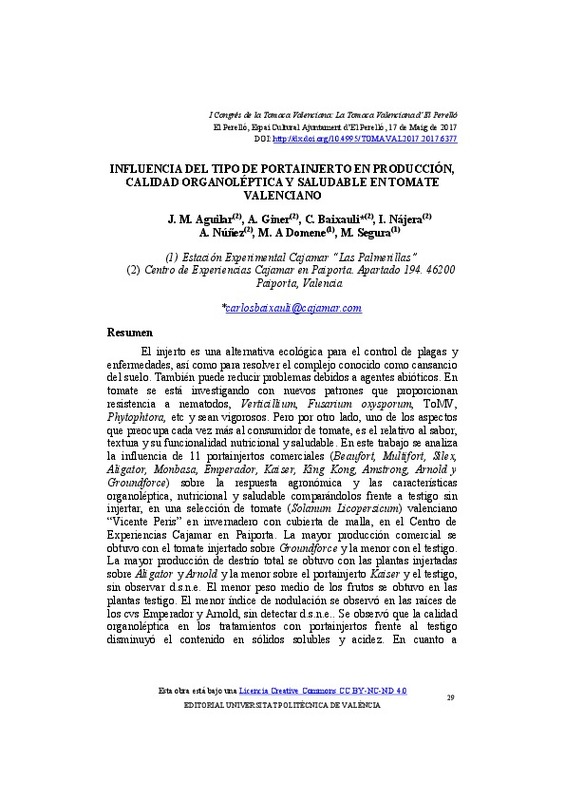|
Resumen:
|
[ES] El injerto es una alternativa ecológica para el control de plagas y
enfermedades, así como para resolver el complejo conocido como cansancio
del suelo. También puede reducir problemas debidos a agentes abióticos. ...[+]
[ES] El injerto es una alternativa ecológica para el control de plagas y
enfermedades, así como para resolver el complejo conocido como cansancio
del suelo. También puede reducir problemas debidos a agentes abióticos. En
tomate se está investigando con nuevos patrones que proporcionan
resistencia a nematodos, Verticillium, Fusarium oxysporum, ToMV,
Phytophtora, etc y sean vigorosos. Pero por otro lado, uno de los aspectos
que preocupa cada vez más al consumidor de tomate, es el relativo al sabor,
textura y su funcionalidad nutricional y saludable. En este trabajo se analiza
la influencia de 11 portainjertos comerciales (Beaufort, Multifort, Silex,
Aligator, Monbasa, Emperador, Kaiser, King Kong, Amstrong, Arnold y
Groundforce) sobre la respuesta agronómica y las características
organoléptica, nutricional y saludable comparándolos frente a testigo sin
injertar, en una selección de tomate (Solanum Licopersicum) valenciano
“Vicente Peris” en invernadero con cubierta de malla, en el Centro de
Experiencias Cajamar en Paiporta. La mayor producción comercial se
obtuvo con el tomate injertado sobre Groundforce y la menor con el testigo.
La mayor producción de destrío total se obtuvo con las plantas injertadas
sobre Aligator y Arnold y la menor sobre el portainjerto Kaiser y el testigo,
sin observar d.s.n.e. El menor peso medio de los frutos se obtuvo en las
plantas testigo. El menor índice de nodulación se observó en las raíces de
los cvs Emperador y Arnold, sin detectar d.s.n.e.. Se observó que la calidad
organoléptica en los tratamientos con portainjertos frente al testigo
disminuyó el contenido en sólidos solubles y acidez. En cuanto a propiedades saludables todos los portainjertos excepto Multifort (menor al
testigo), tienen un mayor contenido en licopeno y en polifenoles totales.
[-]
[EN] The graft practice is an ecological alternative for control of pests and
diseases, as well as to resolve the exhaustion of the soil. It can also be used
to reduce problems due to abiotic agents. Tomato crop is under ...[+]
[EN] The graft practice is an ecological alternative for control of pests and
diseases, as well as to resolve the exhaustion of the soil. It can also be used
to reduce problems due to abiotic agents. Tomato crop is under research and
new rootstocks have been evaluated for providing resistance to nematodes,
Verticillium, Fusarium oxysporum, ToMV, Phytophtora, etc and to confer
plants vigour. But on the other hand, some of the aspects that have an
increasing concern for the tomato consumers are taste, texture and
nutritional and healthy functionality. This work analyzes the influence of 11
commercial rootstocks (Beaufort, Multifort, Flint, Aligator, Monbasa,
Emperor, Kaiser Permanente, King Kong, Armstrong, Arnold and
Groundforce) on the agronomic behavior and organoleptic, nutritional and
healthy characteristics over a selection of tomato (Solanum Licopersicum)
Valenciano "Vicente Peris", compared to a control without grafting. The
crop took place under a mesh cover in the facilities of Research Centre
Cajamar in Paiporta. The largest commercial production was obtained with
the tomato grafted on Groundforce followed by Armstrong and the minor
production was achieved by the control. The highest non-commercial
production was obtained with plants grafted on Alligator and Arnold and the
lowest plants grafted on the rootstock Kaiser and the control, without seeing
d.s.n.e. The lower average weight of the fruits was obtained in control plants
without grafting. The lower nematode index was observed in grafted with
Emperador and Arnold without seeing d.s.n.e. It is noted that organoleptic
quality on the treatments with rootstocks decreases, mainly the content in
soluble solids and acidity, in front of the control.. In terms of healthy
properties all rootstocks have a higher total content of lycopene and
polyphenols, except Multifort (lower than the control).
[-]
|








